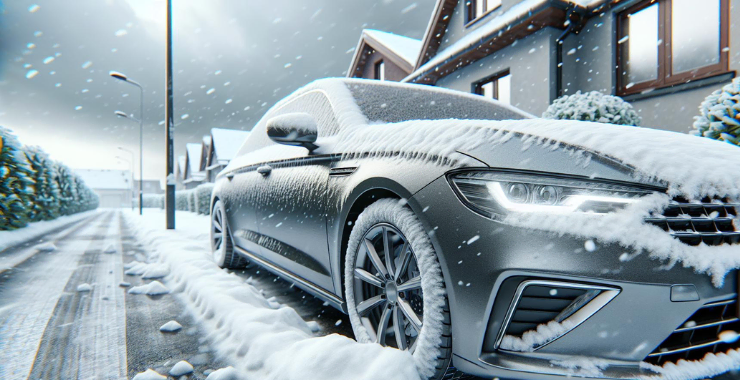Having car trouble starting your vehicle when it’s cold outside is frustrating, especially if you know you have a good battery. But many other factors beyond the battery can cause issues with cold weather starts. This article will cover the most common culprits and solutions to help get your car going even when the temperature drops.
1. Check the Battery and Connections
Corrosion on the battery terminals can prevent a solid connection to the starter, particularly in frigid conditions. Loose or frayed battery cables can also restrict power flow. Cleaning corrosion and tightening connections is a crucial first step when troubleshooting cold-start problems. If the battery is over 3-4 years old, have it load tested or replaced, as its capacity diminishes with time. Learn more signs that indicate you may need a new car battery.
2. Inspect the Starter Motor
Starter motors can struggle when cold out due to thickened motor oil and increased resistance. Symptoms of a failing starter include clicking noises or the engine not cranking at all when the key is turned. Tapping on the starter with a tool can sometimes temporarily unstick it. But replacing a worn-out starter is often the necessary long-term fix.

3. Examine the Fuel System
Condensation buildup inside the fuel tank and lines can lead to ice blockages and prevent fuel flow. Low-quality gasoline can gel in the cold, clogging filters and injectors. Adding a fuel system antifreeze like Heet helps dissolve any ice issues. Replacing the fuel filter and using high-quality winter-blend gasoline is recommended.
4. Check the Ignition System
Spark plugs and wires may fail to produce an adequately strong spark when cold. Distributor caps and rotors can accumulate moisture and then crack, disrupting spark delivery. Upgrading to new, robust spark plugs and wires boosts cold-weather performance. Water-dispersing sprays help remove dampness from ignition components.
5. Address Oil and Fluids
Motor oil thickens significantly at low temperatures, making ignition more laborious for the starter motor. Switching to thinner 5W-30 oil improves cold weather starting. Topping off low coolant and power steering fluid prevents freezing damage. Utilizing an engine block heater warms the oil and coolant when the car sits overnight.
6. Inspect the Alternator and Belts
A failing alternator may be unable to keep the battery properly charged for reliable cold starts. Worn or loose alternator belts can slip more under the strain of winter temps. Signs of alternator issues include dimming headlights and a whining noise. Have your local mechanic examine the alternator and belts, replacing worn components.
7. Consider Engine Compression and Flooding
Low compression from tired internal engine parts hinders ignition in cold weather. Avoid pressing the gas pedal excessively while cranking, which can flood the engine with surplus fuel. To clear a flooded motor, press the pedal fully to the floor when cranking, don’t pump it.
8. Check for Faulty Sensors
Defective coolant temperature, crankshaft position, or throttle position monitoring can disrupt starting operations. Diagnostic trouble code scanning at an auto shop can pinpoint sensor issues needing replacement.
Prevent Problems with Preparation
Parking your car in a garage or carport whenever possible prevents exposure to extreme overnight temperatures. Using a battery warmer blanket or trickle charger maintains a fully juiced battery. Fuel stabilizers before winter deter condensation issues. A comprehensive fall tune-up with fresh fluids and filters preps your engine for old man winter’s worst.
In summary, cold temperature starting problems can stem from multiple systems beyond the battery, including oil viscosity, the starter, alternator, sensors, ignition, fuel delivery, and engine compression. Diligent winterizing maintenance and emergency kit preparation help prevent headaches should frigid temps stall your engine, allowing you to get back on the road faster.
FAQs
Why won’t my car start in the cold, even with a good battery?
A good battery alone can’t guarantee starting in the cold. Issues like oil viscosity, starter motor function, fuel gelling, sensor failures, and low compression could be factors.
Is a slow crank in the cold normal?
Slow cranking when cold can indicate starter strain or thick oil rather than a battery problem alone.
Can thick oil cause cold starting issues?
Yes, cold temperatures thicken motor oil which makes ignition more difficult.
Will lighter oil help with cold starts?
Yes, lighter viscosity oils like 5W-30 can improve cranking in cold weather.
Can a weak battery alone prevent starting in the cold?
No, even a strong battery can’t overcome other failures like bad sensors or gelled fuel that prevent starting.
Does parking in a garage prevent cold starting problems?
Yes, parking in a garage shields a vehicle from the coldest temps that contribute to starting issues.
